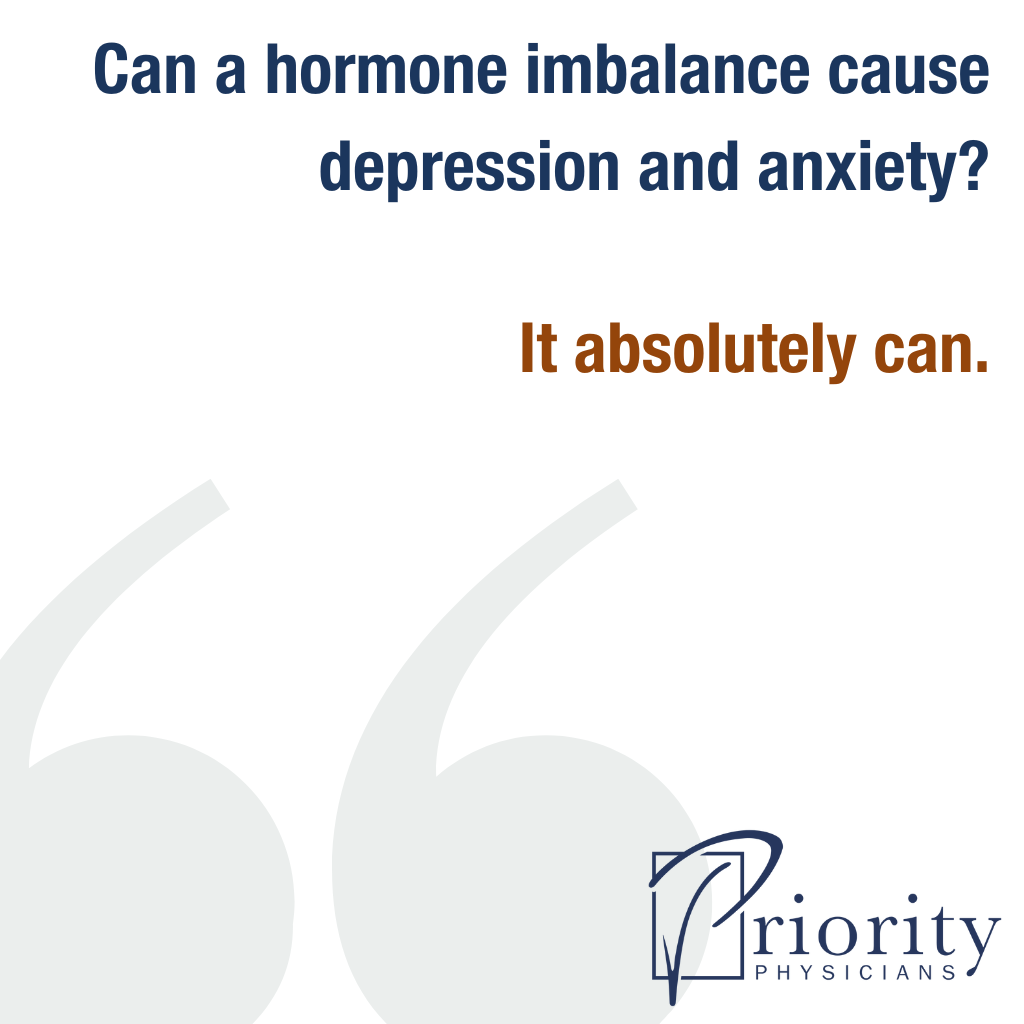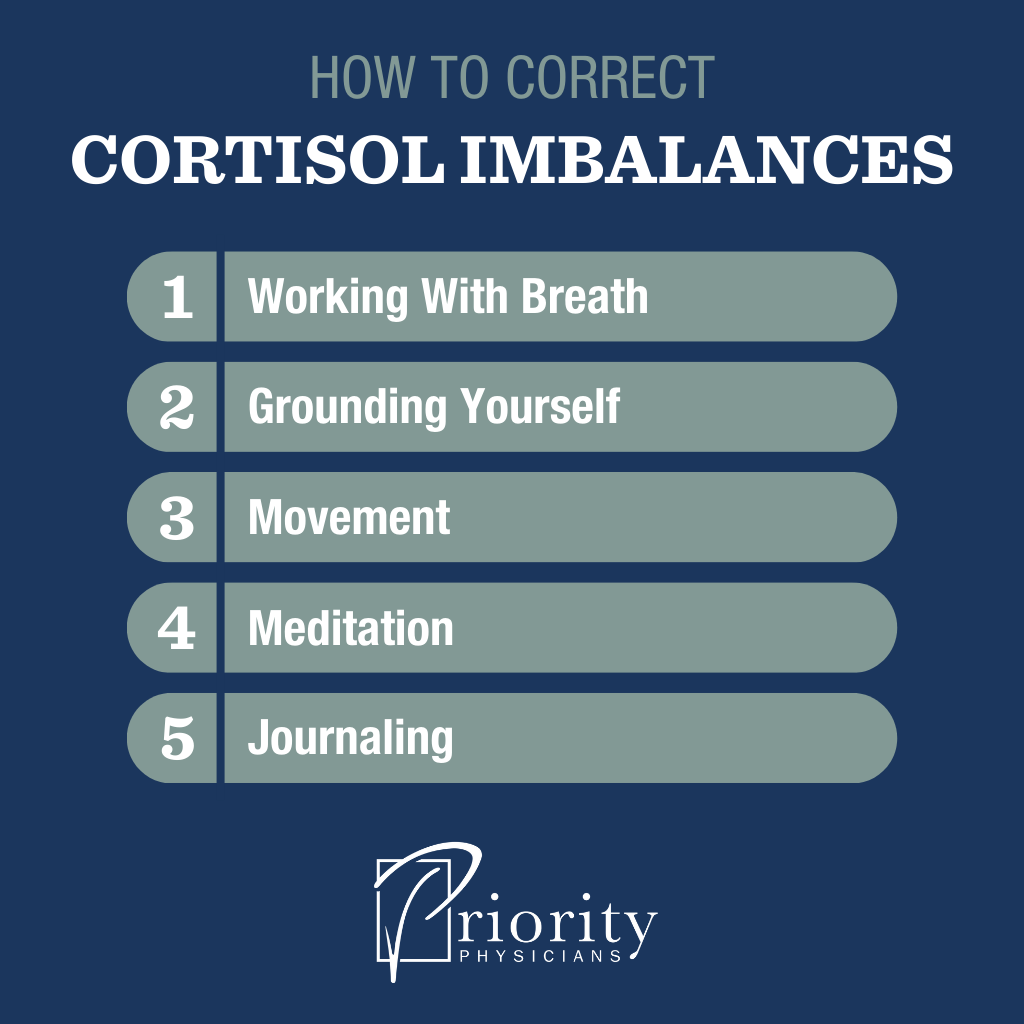Anxiety and depression are common mood disorders triggered by a vast number of factors — so vast, in fact, that sometimes we can’t identify a specific cause.
Anything from genetics to traumatic life experiences can alter your mood. Unfortunately, many of these factors are out of your control, both physically and emotionally.
Because primary care physicians aren’t psychiatrists, much of what we try to do when approached about mood disorders is to rule out potential “secondary causes.” I’m often asked, “Can a hormone imbalance cause depression and anxiety?” It absolutely can.
In fact, one of the most common “secondary causes” of depression and anxiety is a chemical imbalance caused by issues with the endocrine system. One of those hormones is cortisol.

Cortisol’s Relationship to Mood
The Normal Function of Cortisol
Cortisol, often referred to as our “stress hormone,” is made by the adrenal glands. Its goal is to help the body respond quickly when it enters fight or flight mode.
Let’s say a tiger runs into your room. Cortisol physiologically mobilizes glucose to the muscles and brain, giving you plenty of energy to think sharply and move quickly to escape the threat.
At the same time, cortisol reduces the body’s more nonessential functions, like digestion, growth, and reproduction. Of course, these functions are very essential to everyday life, but they aren’t immediately required to escape a tiger. Cortisol redirects all your resources toward evading danger, working hand-in-hand with other systems as a larger part of your sympathetic nervous system.
After you get away from the tiger, your body should release that activated stress response, at which point your cortisol levels will drop and you’ll be able to go on with your life.
The problem comes when you don’t release that stress response.
The Result of High Cortisol
When your body fails to return to a resting state, you don’t stop producing cortisol. Cortisol levels that are constantly elevated lead to constant feelings of stress, even when you’re not actively facing danger.
High cortisol can cause chronic high blood sugar and blood pressure, fatigue (which actually leads to trouble sleeping), and chronic nervousness and fear — even if you know there’s nothing “chasing” you.
The overall result is anxiety.
The Result of Low Cortisol
Conversely, it is rarer but possible to have constantly low levels of cortisol. While some rare medical issues can reduce the amount of cortisol your body produces (adrenal gland tumors, autoimmune disorders, etc.), these aren’t normally the cause.
When I see low cortisol levels in my patients, it’s typically because they’ve been overdoing it. They’re pushing themselves to the point of burnout. They’re not sleeping or eating well, and/or they’re overexerting themselves during exercise.
In these situations, we’re constantly firing on all cylinders — until we’re not. And then our health declines. This results in fatigue, then depression.
How to Correct Cortisol Imbalances
To break the cycle of imbalanced cortisol, we need to call on our parasympathetic nervous system — the other nervous system that controls our unconscious bodily functions.
Here are a few techniques I recommend:
Working With Breath
One of the fastest ways to step out of fight-or-flight mode is to use box breathing. With this technique, you focus on the pattern of inhaling, holding your breath, exhaling, and holding your breath for even lengths of time.
Try doing each step for five seconds, and repeat the process for three or four cycles of breath. It can make a huge difference in lowering your heart rate and your cortisol levels to achieve a calmer state.
Grounding Yourself
Creating a safe environment can also help. Physically sit in a space that’s grounding, like a comfortable chair or on the grass. Plant your feet firmly on the ground, and focus on the feeling of support you get from that seat.
When you focus on what your body is physically connected to, you aren’t thinking about what’s going on around you, and this can help lower cortisol levels. Doing this for even two or three minutes can make a massive difference.
Movement
If you’re in a space where you’re able to do so, a quick round of jumping jacks, a walk, or a short dance party will boost your serotonin and endorphins. Full-body movement can induce these “feel good” hormones that burn out cortisol and extra blood sugar. When you’re done with your movement, you can return to what you were doing before, but with your cortisol levels reset.
Meditation
At first, this may not be the easiest technique. Meditation can take a lot of practice, but there are many free resources out there that can help you get started. Try guided meditations on YouTube, or on apps like Calm and Headspace. Routine meditation practice can calm the mind and regulate cortisol levels.
Journaling
This one only takes a few minutes. Journaling, or “thought dumping,” can help lower your cortisol levels. Grab a notebook and your favorite pen, and write down all your feelings on the page.
After you write out your thoughts, reread what you wrote and underline the parts that are factual — for instance, “It’s raining” may be a fact, but “The rain is ruining everything” is not.
It’s easy for our negative thoughts to muddy our view of reality. If we can identify untrue thoughts and focus on thoughts that are valid and positive, we can reduce our stress levels.
Final Thoughts: Can a Hormone Imbalance Cause Depression and Anxiety?
So, can a hormone imbalance cause depression and anxiety? Absolutely, especially if that hormone is cortisol.
Thankfully, the five actions listed above are simple and effective, and you can practice them every day — even when you aren’t feeling overwhelmed. Regularly practicing these techniques can prevent you from feeling stressed or burned out in the first place.


